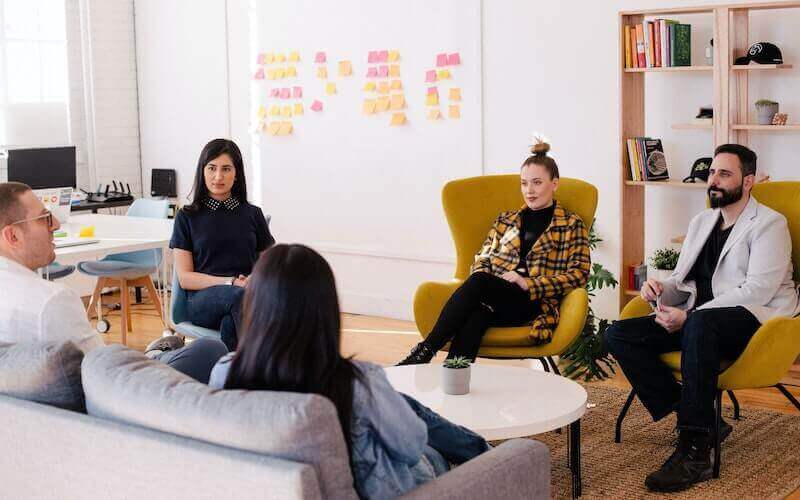Culture Assessments
Diagnostic Services for Climate Related to Inclusion, Diversity and Equity
Workplace culture can be difficult to define when we exist within it. We have our ideas of what we’d like the culture to be; however, we know there’s often a difference between the ideal and the real. An outside culture assessment helps an organization understand where they are currently by exploring how employees experience the workplace.

“We want to broadly understand the culture, because we want to do work that aligns with the existing culture.”
Why a Culture Assessment Can Help
When an organization’s vision and values aren’t reflected in its culture, the result is often a lack of employee engagement, reduced collaboration and trust, and loss of productivity. Through culture assessment, we can see how aligned the culture is. Inclusity’s tools identify incongruities and clarify specific areas of opportunity particularly related to inclusion, diversity and equity. For instance, we measure where and how employees feel or experience exclusion. We look at areas that influence employee engagement and sense of belonging. What we uncover in our analysis provides the organization with specific recommendations so that it can work to re-align the culture with its vision.
Assessing culture is an important check-up, and a crucial first step on an organization’s path to develop or strengthen strategies toward inclusion and diversity goals. The analysis can also help establish baseline metrics so that the organization can measure DEI efforts moving forward.
How We Assess the Climate
Sometimes consultants start work with a new client assuming they know what the problems are. Inclusity does the opposite; we assume nothing. We rely on both the qualitative and quantitative data we gather to form a comprehensive picture of an organization’s existing culture and needs.
Depending on the client’s needs, Inclusity uses various tools to audit an organization’s culture, including focus groups, one-on-one interviews, analysis of existing data, and surveys.
Climate Survey
Gathering input from as many employees as possible is critical in culture assessment. This is an opportunity for employees to anonymously share their thoughts and experiences in relation to belonging, diversity, and equity at the organization. An online survey can summarize the perspectives of many individuals, as well as provide baseline metrics that can be directly compared with subsequent measurements.
Inclusity’s climate surveys are customized for each of our client partners and are 100% confidential. This anonymous approach ensures that employees feel comfortable giving honest feedback, whether it’s positive or negative.
While we customize the surveys for each client’s needs, our questions fall under these themes: well-being, belonging, harassment, hostile behavior/bias, working conditions, perceptions of climate, personal values, diversity opportunities, leader support/inclusion, and retention.
As part of a long-term partnership with our clients, we hand over ownership of the climate survey after our work with them concludes. That way, clients can continue to use and refine the same instrument, allowing them to make apples-to-apples comparisons in subsequent years and chart changes in the culture over time. We work to be transparent about how the data influences our decisions about what solutions to implement, empowering our clients to self-diagnose their areas of need in the future.
1:1 Interviews
Face-to-face conversations, like one-on-one interviews and focus groups, generate meaningful information that enriches any quantitative data we collect. As we work to understand a workplace culture, it’s important to hear directly and candidly from key stakeholders. Often, this means the organization’s leadership or members of under-represented people groups.
Confidential, one-on-one interviews help Inclusity to build trust, establish credibility, and identify training and leadership development needs in an organization. The information we gather from leaders can also provide a sense of the organization’s strategic alignment with inclusion and diversity efforts.
Focus Groups
Focus groups offer insights that help develop a more thorough understanding of the organization’s existing climate, including identifying where perceptions differ between groups. Information shared in a group discussion can prompt participants to expound on topics, revealing important nuances that would be missed through surveys.
In safe, confidential discussions, our trained facilitators meet with small groups of approximately ten employees. Groups may include supervisors, managers and individual contributors and are broken out by like demographics (e.g., age, race, gender, and location) to increase employee safety and comfort throughout the process. To create a significant base of information, we suggest conducting focus groups with 10% of the organization’s overall population.
Existing Data
In addition to collecting new data, we can audit existing sources of quantitative data to better understand the organization’s culture.
Policy Review
Examining your organization’s current policies and procedures can offer key insights into the relationship between written policy and workplace climate. Analysis helps identify opportunities to enhance internal policies or practices so that they can be as inclusive and equitable as possible. In particular, we look at processes for hiring (including position descriptions, diversity of interview panels, etc.), promotion, development, and succession planning.
Inclusity has developed an inclusive policy template tool that we can modify to reflect the organization and its specific principles for diversity, equity, and inclusion in the organization.
Grounded in Research
We also believe in collecting data insofar as it is useful. We neither want just to scrape the surface of the possible information nor dive so deeply into the data that we lose sight of the work the client needs and expects to improve its culture.
Inclusity’s Director of Research and Evaluation, Dr. Mitchell Campbell, has extensive experience obtaining and analyzing relevant data and using key insights to develop diversity, equity, and inclusion initiatives. With a Ph.D. in Psychology from the University of Wisconsin at Madison, he is passionate about developing evidence-based solutions to promote inclusion that are supported by data.


Confidential and Compassionate Approach
Confidentiality and trust are at the heart of Inclusity’s work, and we take them very seriously. Facilitators take great care to establish a safe, trusting environment where participants feel comfortable giving honest feedback. Our facilitators have decades of experience leading interviews and focus groups related to inclusion and diversity. They are there to learn from the participants, so they suspend judgment and approach the work through the lenses of empathy and inclusion.
Whether it’s responses from climate surveys, focus groups, or interviews, we protect the participants’ confidentiality. We aggregate data to safeguard anonymity and report no information that would identify anyone as a participant.
Findings
Through the insights gathered from culture assessment tools, Inclusity can develop a comprehensive view of an organization’s culture and its needs. After analyzing and summarizing the data, we present trends as well as recommendations for next steps. The analysis will help you develop baseline metrics so you can measure IDE efforts moving forward.

Want More Info?
Take a look at this handout for more details, and feel free to print and share with colleagues.
What Our Clients Say
This process has done more than 20+ years of diversity and inclusion training.
View Dates & Register
